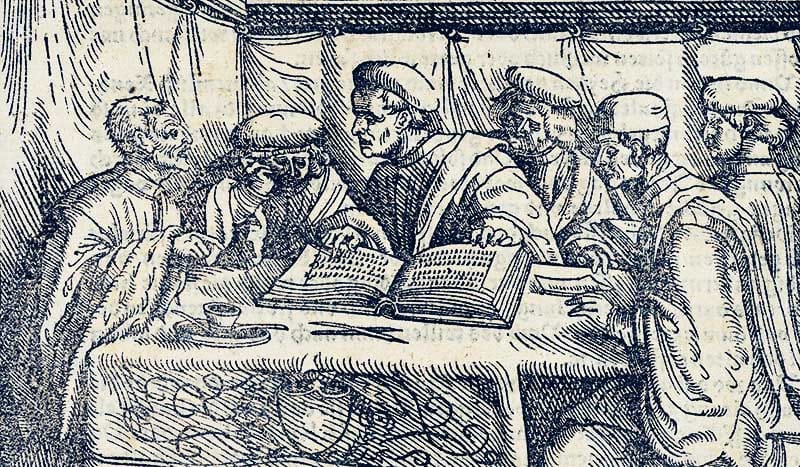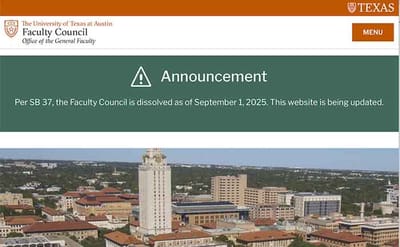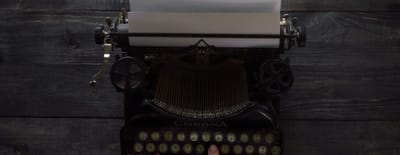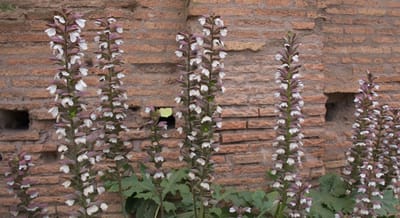
In the previous installment, I offered a definition of academic freedom around which our collective defense must be organized. It is a definition that many will find too limited in its scope, and I will address more expansive definitions—and the problems they pose—later. But in this moment of crisis for higher education, I believe it is vital to focus our defenses on these core principles:
Academic freedom is the right of faculty to research and teach the truth as they understand it within their areas of expertise, confident that—so long as they are researching and teaching ethically and responsibly—their right will be protected regardless of pressure from outside or within the institution.
In this entry, I want to focus in more detail on the topic of “expertise.” The protections of academic freedom depend on expertise in fundamental ways—on the argument that those hired by a university to pursue and teach the truth within their areas of expertise should not be limited by school officials, alumni, legislators, or other non-experts in that pursuit. It is faculty expertise—affirmed first via credentials (usually a terminal degree, such as a PhD or MFA), and reaffirmed through repeated and regular review of their work by peer experts outside of the institution—that earns them this freedom. A professor is hired by their institution to conduct research and teach in a particular area, and once hired, their freedoms in how they conduct their research and how and what they teach have strong protections from interference, even by the institution that hired them.
Expertise can seem an abstract category. In some fields expertise is easier to grasp than in others. For example, in many areas of study and teaching there is a vast body of concrete knowledge, technical language, research techniques, systems and their interactions, and history and precedent that must be grasped before one can even imagine being prepared to claim expertise. The mastery of that vast body of knowledge is demonstrated by clearing hurdles—for example, comprehensive exams, boards, or licensure. Expertise sufficient to grant academic freedom in research often follows from that mastery, perhaps collaborating as a postdoc or a junior faculty member in the making of original knowledge built upon those shared foundations. Specialization and focus allow these newly-credentialed experts to deepen their knowledge and to make new knowledge beyond the mastery of the foundations laid in their graduate and early professional careers. And soon, as an expert in your field, you are mentoring the next generation of experts who have sought you out for your own unique expertise.
I will discuss in the next installment some of the academic areas where expertise is more contested or harder to define and defend in this current climate. For now, I want to stick with clearer examples in order to explore why expertise and academic freedom are and must remain so tightly yoked. We will also discuss why academic freedom is always bound to academic responsibility—including, for faculty, the responsibility to develop expertise.
Growing up, my father regularly pontificated on things he knew little about. He was a voracious reader and autodidact, but his course of study was often scattered. When he grew tired of a topic, he would move on to a new one. That did not stop him, however, from speaking with profound authority on areas of study he had left half-baked along the way. I picked up some of this habit myself, and when I became a father, I took it as my duty to hold forth on things about which I had only passing knowledge.
But the internet very soon spoiled all of that for me. My kids quickly learned how to doublecheck my assertions, taking great pleasure in correcting me when claims based on half-remember, half-read books were contradicted by wikipedia. I would have gotten away with it, too, if not for that meddling internet.
It goes without saying, I did not possess expertise in the topics on which I was expounding. And by age ten, my kids knew this. Yes, they knew their father did possess expertise in a couple of areas, topics on which they would not bother to fact-check me. But when I started explaining how the internet worked, they knew that the internet itself was a more reliable source of information. They had learned, all too soon, the difference between expertise and the bloviating to which dads have been historically inclined.
We know this of course in our daily lives. At a party you might try to buttonhole a dermatologist to look at the strange rash on your neck. But presumably you would not grant a lot of authority to host’s teenage son who insists that your rash looks “exactly like” one he saw on the internet that “this guy” got after dating a cannibal. To be clear, the sharing of urban legends has its social function, and I would never want to stand in the way of a good creepypasta about skin ailments. But it will hopefully be the dermatologist whose advice you will follow, even if you happened to have recently been involved with someone who might, in fact, have had anthrophagous inclinations.
I say “hopefully,” because we live in a time of collective derangement, one in which non-experts often exert more influence over life-and-death decisions than do those possessed with the expert knowledge and experience necessary to make them. Indeed, for the first time in our history, there is a deliberate and systematic effort to replace experts in fields such as education, public health, the military, and national security with self-styled experts who have “done their own research.” Our current Secretary of Health and Human Services possesses no credentials or other expertise that should justify his power to make decisions about vaccine health, SSRIs, or diet. It was a matter of a minute before the consequences of skepticism about measles vaccines was seen in the form of a major measles outbreak. I’ll return to the world of conspiracy theories, urban legends, snake oil, and the self-proclaimed and newly empowered “experts” working to make falsehoods reality, but before wading into that swamp I need to ground myself in the stable ground of expertise.
In 1930, Arthur Lovejoy provided an important early definition of academic freedom:
Academic Freedom is the freedom of the teacher or research worker in higher institutions of learning to investigate and discuss the problems of his science and to express his conclusions, whether through publication or in the instruction of students, without interference from political or ecclesiastical authority, or from the administrative officials of the institution in which he is employed, unless his methods are found by qualified bodies of his own profession to be clearly incompetent or contrary to professional ethics.
The highlighted subordinate clause reminds us that not everything we teach is protected, even when the material is relevant to the course and also relevant to the expertise for which one was hired. More importantly, it spells out the conditions whereby we secure our freedom to pursue the truth: we must pursue knowledge according to methods and ethical guidelines agreed upon by our professional peers—a group to which we belong due to our own academic expertise.
For faculty, expertise can be defined in three stages of development:
- Mastery of a body of knowledge, the history of its production, and the methods deployed in its acquisition.
- Command of the current conversations among experts in a field, with especial attention to how and where the body of knowledge mastered in #1 is being expanded or challenged.
Only once these two are achieved, over the course of years of study, does the faculty member arrive at the third stage in which they themselves emerge as recognized experts in their field:
- Ability to change the field by advancing, redirecting, reshaping, and/or revising the body of knowledge which the next generation will need to master before themselves proceeding to #2 in their own development.
The first—mastery of a body of knowledge—is most commonly secured through graduate and postgraduate education, credentials, licensure, etc. The second is secured through ongoing professionalization, including staying informed of research and changing methods in the field, attending and presenting at conferences, and beginning the mastery of undergraduate teaching.
The acquisition of #3 generally takes place through the production of original scholarship that builds on #1 and #2, during what has traditionally been the “probationary period” preceding tenure. These years, in which a tenure-track faculty member is employed but not yet assured of continued employment, are perhaps the most stressful of a young scholar’s career. After having cleared the hurdles of #1 and completing the work of #2 necessary to enter themselves into the work of the field, the “clock” starts ticking immediately, requiring the faculty member to demonstrate to their senior colleagues and to the outside reviewers who play a crucial role in their promotion that they are now ready to change the field.
Every field differently defines the ways in which a faculty member is acknowledged as a potential change agent in that field and, therefore, an individual worthy of the immense commitment of trust that is tenure. In my world of the Humanities, it is most often measured through the publication of the faculty member’s first peer-reviewed book. In some fields it is measured by securing a major research grant or being published in respected journals. All versions of this rite of passage, however, depend crucially on one key feature: peer review.
This peer review is conducted by the faculty member’s own colleagues, by the peer-reviewed process by which the book or essays were accepted for publication or the grant awarded, and by expert scholars in other universities who are asked to comment on the faculty member's scholarly contributions to the field. By the time a new assistant professor is awarded tenure, their work will likely have been evaluated by dozens of scholars in their field. And their claims to the expertise that secures them academic freedom derives from a long process—beginning in graduate school if not before—of submitting their expertise to the judgment of other experts.

In 2019, responding to growing criticism of higher education supposed impositions on “freedom of speech” on campus, the AAUP released a statement titled, “In Defense of Knowledge and Higher Education.” The statement is worth reading in full six years later, as the “crisis” to which they were responding has now entered an existential phase. Here, however, I want to focus on the statement’s important distinction between individual free speech and academic freedom.
In our democracy, every person, regardless of competence or qualification, is entitled to have an opinion because democracy requires political equality. Freedom of speech is therefore a precious right possessed by each individual, including members of colleges and universities. Together, through the exercise of freedom of speech, we forge a common political will.
The production of expert knowledge, by contrast, is not about the formation of political will. The first premise of scientific procedure, Thomas Kuhn famously observed, is that we do not submit questions of scientific knowledge to a vote. That is because knowledge is not about our political preferences; it is about the nature of the world. Expert knowledge is therefore not produced by simple freedom of speech. A major symptom of our contemporary crisis is that some nevertheless seek to subordinate expert knowledge to public opinion.
There are several reasons we must recommit to distinguishing freedom of speech from academic freedom. But as the 2019 report suggests, our failures to do so have left higher education exposed to charges—some ill-conceived and some strategic—of suppressing students’ free speech.
Some of these charges, while exaggerated, should be given careful attention, especially when they involve universities and professors trying to adjudicate the perilous line between free expression and harmful speech. But many of them involve charges that faculty are suppressing student speech in the classroom by restricting time spent addressing arguments that are contradicted by the expertise the professor is hired to convey. A student has every right to attend a class on evolutionary biology or climate change, despite believing that evolution or climate change are in fact not true. They even have a right, within significant time constraints, to express their opinions in class. But the professor is nonetheless required to teach the subject matter as it has been adjudicated through millions of pages of peer reviewed research, and the student is expected to master that subject matter as taught, regardless of their individual opinion.
The responsibilities run the other way as well, and indeed this scenario might be especially useful in thinking about the ways in which both students and faculty must submit to expert knowledge in the classroom. For students, it is the faculty member who represents the knowledge to be mastered and determines the bounds of what is and isn’t relevant to the goal of mastering of the knowledge for which the class is responsible.
I borrow the following scenario from a colleague in the law school who recently presented on academic freedom to our University Senate. She offered the hypothetical of a long-time astronomy professor who had become utterly convinced that the moon is made of blue cheese. This professor had been unsuccessfully trying to publish his theory in academic journals, but his papers have been rejected by every peer reviewed journal.
Should the fact that dozens of peer reviewers have rejected his Blue Cheese Theory (BCT) prevent him from teaching the students in his Introduction to Astronomy class that the moon is made of blue cheese? After all, astronomy is his area of expertise, and he is a tenured professor with numerous publications.
I trust it will not be controversial when I suggest that the professor is not covered by academic freedom should he choose to teach his Blue Cheese Theory in his Intro to Astronomy students. Teaching that which is universally understood by the field to be wrong—in this case, absurd—would represent both misuse of the students’ investment (of time and tuition) in the class and harm to the reputation of the department and institution.
It is important to recognize that in this scenario, the research is not unethical. Nor can our professor be compelled to cease devoting his scholarly research to BCT—neither by his university nor by fellow scholars in his field. He retains the academic freedom to pursue the truth as he sees it, and he retains the right to publish that research in non-peer reviewed venues—such as a personal blog or a non-academic periodical. But just as a student cannot consume valuable class time in the Introduction to Astronomy course by arguing that the sun revolves around the earth, neither can the professor use that time to teach what no other scholar in the field would recognize to be true. A professor’s right to impose limits on students’ speech in the classroom depends on their willingness to put limits on their own speech in terms of teaching the body of knowledge, methods, and other established course goals.
No convincing “research” or “evidence” in defense of BCT is available to counter the extensive evidence and data that has secured consensus regarding the makeup of the moon. Our professor might once have been a luminary in his field, but he has chosen to put his expert status at risk by rejecting a fundamental truth in his field without evidence or argument sufficient to convince anyone else in the field. While his theories might find audience on the internet or at a local cheese festival, they have no place in the “conversation” of academic research. Our professor should be told by his chair or dean to cease teaching this theory. Should he continue to do so, he should be investigated and potentially sanctioned for failure to fulfill his professional responsibilities in the classroom. That sanction can include the revocation of tenure.
I know some will object to the suggestion that a tenured faculty member could be restricted in what he chooses to teach, let alone potentially terminated for refusing to stop teaching it. But I trust a few moments’ reflection will illuminate why this must be the case.
As the AAUP statement in 2019 points out, the consistent discrediting of the very idea of expertise enables the refusal to accept basic facts—such as climate change—and to attribute to the experts themselves the most pernicious of political motives. In this climate, it is all the more urgent to rigorously insist on the importance and responsibilities of expertise and the peer review that shapes and defines it. “Expert knowledge is not produced in a ‘marketplace of ideas’ in which all opinions are equally valid,” the 2019 statement argued. “The dialogue that produces expert knowledge occurs among those who are qualified by virtue of their training, education, and disciplinary practice.”
It is that expertise that secures the classroom from the countervailing demands of free speech. Without the unique space of the classroom in which expert knowledge can continue to be taught and future experts can be trained, there is no ground from which expert knowledge can be insulated from the “marketplace of ideas.”
When I walk across the oval between classes, I might encounter speech proclaiming all kinds of opinion. As a state institution, my campus grounds are state property, and first amendment rights have primary claim upon the rules of engagement. We have students and visitors committed to many positions on everything from abortion and climate change to which candidate should be elected to student government. There is often an itinerant preacher or two testifying to the benefits of anti-onanism or suggesting to passing students that they are going to hell. This is the space for free speech, limited only by content-neutral time-place-manner restrictions. Most of those prohibitions focused on things such as amplified sound, blocked access to university spaces, or disruption of classes or meetings. The campus preacher and the rest are free to do their thing.
The classroom is a different kind of space. While free speech still applies, it is constrained by different factors than the time-place-manner restrictions that govern the rest of campus. Within the classroom, speech is constrained in order to secure the academic freedom of both students and professor. For the students, this academic freedom includes the right to question and test the claims of the course in the process of mastering the course’s promised outcomes. For the professor, academic freedom accords them the right to place restrictions on speech in their classroom in the service of the students’ academic freedom, even as it imposes on them a requirement to restrict their speech accordingly.
One frequently cited—and occasionally contested—category of restricted classroom speech is the category of hate speech. As a government institution, my university cannot restrict hateful speech I might encounter on the oval. A speaker in the public space of the university cannot be prevented from arguing for white supremacy or telling women they are violating divine law by seeking an education. If there is no way for students to get to their destination without subjecting themselves to this speech, campus authorities might consider relocating the speaker to a space which will allow students to make an informed choice as to whether they wish to hear his words. But that is as far as they will go, so long as time-space-manner restrictions are not being otherwise violated.
But in the classroom, the professor has a right and responsibility to prohibit such speech as both irrelevant and as hostile to the learning environment and therefore to the learning outcomes for the course. Like many other, I spell out clear guidelines as to the expressive rules of the road in my syllabi, in part because the university cannot establish universal guidelines that would in any way impose on free speech. While I am in the classroom I set the guidelines, and when I leave that classroom and in the hands of the professor of the next class, their guidelines apply. So long as my expectations are clearly stated and—like the time-place-manner restrictions on the oval—are consistently applied and limited to that which is absolutely necessary for the functioning of the class, then I am well within my rights.
And of course, as we have discussed, students have the first amendment rights to refuse to accept the validity of even the most well-established peer-reviewed knowledge. And the professor cannot and should not punish the student for expressing their refusal, even as they have a responsibility to explain why—within the bounds of their area of expertise and the course itself—the student is in fact wrong. And as with the professor who insists on teaching Blue Cheese Theory in the Introduction to Astronomy class, a student who repeatedly insists on articulating his rejection of the fact that the Earth revolves around the Sun can be told enough is enough. And they can be removed from the classroom if they continue to take up the time of their peers and professor in this manner.
Time, place, and manner restrictions are a content-neutral. Classroom restrictions are content-partisan. The power to place such restrictions—even and especially in opposition to the principles of individual free speech—is a daunting, humbling responsibility. It is a power earned through expertise and enforced solely in the name of academic freedom and responsibility—too often referenced in shorthand without the crucial emphasis on responsibility. Individual expertise is never individual, but always defined by and bounded by the community of field experts. Similarly, academic freedom is never wholly free, but is always restricted by the responsibility to truth in the field of expertise. As knowledge makers, we are push against those restrictions in pursuit of new truths. But we seek not to be “free” of restriction, but to move the bounds by which those who follow in the field will be circumscribed as they set out to test these limits.
Free speech is an individual right foundational to a democratic ideal. Academic freedom, on the other hand, is about the individual only insofar as that individual is bound to a community’s commitments and judgments. Unlike free speech it refuses the premise that all speech is equal, but only within the bounds of that community of expertise. Democracy is forged in the cacophonous public square of free speech. Knowledge is forged through the evolving consensus of expertise.
While at the end of this long meditation, these two forms of “freedom” might seem worlds apart, we see today more than ever how mutually dependent they truly are. We see it today because both are currently facing extinction-level threats.
In the next installment I will delve deeper into the constraints on academic freedom that preserve the role of expertise, before turning to a consideration of the ways in which expertise is under extreme assault from outside (and, sadly, inside) the academy.
Subscribe (free!) to receive the latest updates






Member discussion